 |
 |
 |
 |
 |
 |
 |
 |
 |
 |
 |
 |
 |
 |
 |
 |
 |
 |
 |
 |
 |
 |
 |
 |
 |
 |
 |
 |
 |
 |
 |
 |
 |
 |
 |
 |
 |
 |
|
 |
|
 |
|
|
Hemlock's Diary |
|
|
|
|
|
|
|
|
|
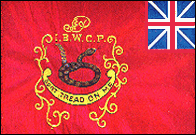 |
|
|
|
|
|
 |
|
|
|
|
|
|
 |
|
 |
|
|
|
|
|
|
|
|
|
|
 |
|
|
14-20 Jan 2007 |
|
|
|
|
|
|
|
|
|
|
|
|
|
|
Mon, 15 Jan
Hong Kong’s bureaucracy neatly fits the meritocratic, impersonal and functional Weberian model, says the latest report from beloved former Security Secretary Regina Ip’s think tank, Savantas. The obvious etymological link of the organization’s name with the phrase ‘idiot savant’ is unfortunate, conjuring up images of a group of people who can perform impressive verbal and numerical feats without actually understanding what they are doing. Reading between the lines of The Hong Kong Challenge – Developing Democracy under ‘One Country, Two Systems’, I detect three main themes. First, we should ditch the tradition of having generalists make policy in favour of technocrats who will channel public wealth into high-tech economic activities of the sort that sounded trendy a decade or four ago. Second, the Hong Kong Government needs to convince Beijing that a more democratic political structure would produce a patriotic administration. Third, we should ditch the tradition of having generalists make policy in favour of technocrats who will channel public wealth into high-tech economic activities of the sort that sounded trendy a decade or four ago. Sesame Street was brought to you today by the word ’Weberian’.
FIVE WEEKS ago, on 5 December, consumed with jealousy at shareholder rights activist David Webb’s ability to move a stock price up by recommending it, I rashly declared Solomon Systech at HK$1.24 to be my pick of the year, with the qualification that it was fit only for investors who would otherwise put the money on horses. Out of curiosity, I check the company’s price this morning and find it is now HK$1.57 – up 26.6%. This would be far more impressive if I had actually bought some.
Tue, 16 Jan
The planet froths righteously at the mouth this morning after the botched hanging in Iraq of Saddam Hussein’s half-brother. Traditionally, hanging was a tortuous method of execution, with the victim wriggling for 10 minutes or more before expiring. Helpful bystanders might grab the legs and pull down to speed the process up. Then the British devised a table listing the exact distance for the condemned person to be dropped through a trap door. Someone weighing 132 pounds would need an 8ft 5in drop, while someone of 140 pounds would need one of 7ft 8in. With a correctly positioned noose, the resulting force would lead the posterior aspect of the foramen magnum to cut the spinal cord superior to the top vertebra and just a little inferior to the brain stem – also known as instant and probably pain-free death, with no gruesome squirming. Along with a bullet in the head, it is the quickest form of execution devised – but with no mess to clear up. If it is done correctly. However if rank amateurs hang a hefty member of the Al-Tikriti clan with an overly long rope, all bets are off and observers get a decapitation thrown in for no extra charge. This is a Very Bad Thing Indeed, says world opinion, scratching its head trying to find grounds for disapproval, because it’s um… undignified. |
|
|
| To make us all feel better, the South China Morning Post is carrying a column by the personable and decent leader of the Democratic Alliance for the Etc Etc of Hong Kong, Tsang Yok-sing. Unfortunately, personable and decent people make dull writers, and this is amply demonstrated in his first piece, in which we are reminded that Dean Kishore Mahbubani of the Lee Kuan Yew School of Public Policy visited Hong Kong last week to tell us that it took the USA 100 years to put the democratic provisions in its constitution into full practice and we can’t expect universal suffrage quickly here. There are two possibilities here – either Mahbubani is right and Alexis de Tocqueville was an idiot, or the other way round. But do we really need lessons in political development from Singaporeans? By coincidence, both Hong Kong and the Lion City went through goods and services tax traumas late last year. In Hong Kong, after lengthy public consultation, street demonstrations and opposition from lawmakers, the Government scrapped the idea of a GST. In Singapore, the GST was raised from 5 to 7% by an edict from the hereditary Prime Minister, Lee Kuan Yew’s son, and the population – forbidden to march or elect opponents – meekly went along with it. So, we have to wonder, which city is the more democratic? Tsang Yok-sing is too nice to say it, but unless we want to know how to hang people with more dignity than Iraq, there is little Singapore can teach Hong Kong. |
|
|
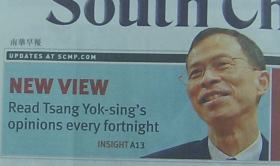 |
|
|
|
| Wed, 17 Jan |
|
|
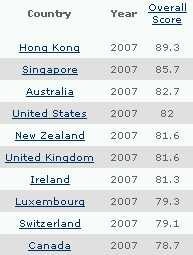 |
|
|
As has happened every year since 1842, the Heritage Foundation names Hong Kong the freest economy in the solar system, and our normally patriotic Government proudly accepts the title from the conservative, Washington DC-based institute that is a stern and frequent critic of the baby-eating godless communists in Beijing and a vigilant supporter of Taiwan’s security and de facto independence. Numerous bores will quibble about the exact ranking in this annual exercise, which reflects the Foundation’s selective criteria. Hong Kong’s cartels are at liberty to rig bids and prices, crush anyone impertinent enough to try to compete and generally suck consumers’ blood – does that count as economic freedom? The Singapore Government compels all workers to pay a portion of their income into a provident fund that politicians and civil servants then invest in money-losing industries that are supposed to make the city look really big and important – pure socialism. However, the broad distribution is a reasonable indicator and solid proof that too much official intervention in the economy reduces wealth creation. Leaving aside Luxemburg on the grounds that its population is smaller than Shatin’s, there is an odd man out in the top 10 – Switzerland, which was never run by the British. Maybe it’s a typo, and it should read Swaziland. |
|
|
|
|
Thurs, 18 Jan
The day starts in the gwailo’s lair on the top floor of S-Meg Tower with a relaxed flick through the news and the shocking revelation that charismatic lateral thinker and Housing and Lands Secretary Michael Suen has become part-owner of a racehorse along with, inter alia, property and casino baron Stanley Ho. This is a Very Bad Development, because Suen might be influenced into making decisions that favour the property cartel rather than the community as a whole – as opposed to what he was doing beforehand. |
|
|
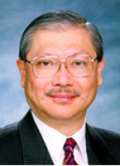 |
|
|
|
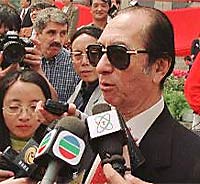 |
|
|
|
|
|
| Meanwhile, valiant Hong Kong immigration officials wielding forceps, urine test kits and ultrasound scanners will squeeze every female Mainland tourist’s tummy thoroughly and refuse entry to all those that are pregnant and haven’t booked and paid a deposit for an otherwise unused bed at a Hong Kong maternity unit. That, at least, is the story in the press. However, a conversation with curvaceous but not-with-child Administrative Officer Winky Ip yesterday evening revealed that this is not strictly the case. A few random checks will take place, but otherwise Mainland mothers-to-be will find it no harder to cross the border than before. The tough new immigration regime is largely a PR exercise aimed at convincing the expectant Mainlandettes to reserve a hospital space ahead of time or stay away. More to the point, Mainland authorities have firmly, indeed brusquely, rebuffed our own officials’ requests to play a part in what, any moment now, some headline writer is bound to call the Battle of the Bulge, assuming they haven’t already. Officials on the other side of the ‘boundary’ as we are supposed to call it, are shrugging and saying, “Your problem, not ours.” After giving the matter intensive thought, it occurs to me that my current and future needs for obstetric services are totally non-existent, and I am in the utterly delightful position of not having to give a damn whether a dozen or a hundred million heavyweight Han honeys waddle into town to give birth. |
|
|
|
 |
|
|
| My joy is interrupted by a knock at the door and the entry into my office of one of the three Stanleys from the mailroom. After the usual kowtowing rituals, he deposits a hefty envelope on my desk, and shuffles out backwards while taking care not to look me in the eye. I open it. My heart sinks. It is the dreaded Action Agenda – several hundred thinly disguised requests for free lunches, especially from Beijing, put together as part of Donald Tsang’s attempt to ingratiate himself with tycoons before his March ‘election’. Officially, it is the report of Sir Bow-Tie’s Economic Summit of people whose names appear on his astoundingly predictable list of bores, suckers and shoeshiners who get dragged into this sort of thing. After speed-reading the 537 pages in half a minute, I believe I can sum up the work in a single sentence. Every industry with votes in the Election Committee will be enhanced in some way, preferably one that can appear in the same sentence as ‘China’s 11th Five Year Plan’ without looking too ridiculous. Into the bin. |
|
|
 |
|
|
|
Fri, 19 Jan
Is someone putting hallucinogenic drugs in the reservoirs? Or are we slipping in and out of a parallel universe through some fifth-dimensional warp in time and space? Gliding down the Mid-Levels Escalator this morning, Hong Kong seemed much as it has been for years – a basically free, orderly and prosperous city in which, as the Heritage Foundation would surely agree, people are at liberty to use their personal resources as they wish and the Government makes only limited claims on the rewards they reap. This week’s Time magazine shows the benefits, with cleverness applied to market forces enabling several Hong Kong companies to quietly assume a pivotal role in much of the world’s trade.
Sitting in my office and reading the South China Morning Post, however, I find I have slipped into a completely different existence. I am now in a city that is doomed to be ‘marginalized’. Backward cities nearby that can move metal boxes on and off ships more cheaply are taking our older industries away. Shanghai now apparently has legal, fiscal, regulatory and administrative structures on a par with ours. Our investors’ and businessmen’s brains have seized up, leaving officials to decide where our economy will go next. And their conclusion is that the Big Lychee should make itself part of the next communist Five Year Plan and beg the Central Government in Beijing to bring China’s economy to its knees by speeding up convertibility of its currency so our banks can make money trading the stuff. The moral here is that it’s best not to read the newspaper.
|
|
|
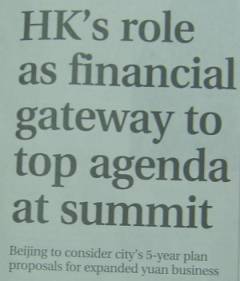 |
|
|









